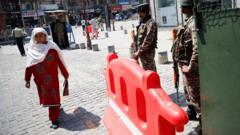In a pressing appeal, the United States government has urged both India and Pakistan to come together in a bid to reduce escalating tensions following a deadly attack in Indian-administered Kashmir. Secretary of State Marco Rubio held talks with both nations' leaders, emphasizing the importance of maintaining peace in the region. The attack, which occurred near Pahalgam, has led to accusations and counter-accusations between the two countries, with India blaming Pakistan for the violence, while Islamabad refutes these claims. Amid a backdrop of military posturing and retaliatory measures, several US efforts to mitigate the situation are underway.
US Calls for India-Pakistan Cooperation to Ease Kashmir Tensions

US Calls for India-Pakistan Cooperation to Ease Kashmir Tensions
The US emphasizes the need for dialogue between India and Pakistan following a tragic militant attack that claimed 26 lives in Kashmir.
The city of Srinagar in Indian-administered Kashmir is currently under heightened security following a militant attack that left 26 civilians dead last week. The US has prompted both India and Pakistan to "de-escalate tensions" after the violent incident. In a significant diplomatic move, Secretary of State Marco Rubio engaged in discussions with India's foreign minister and Pakistan's prime minister this Wednesday, pressing both leaders to "maintain peace and security in South Asia."
India has accused Pakistan of orchestrating the attack which occurred on April 22 at a picturesque meadow close to the resort town of Pahalgam, a charge that Pakistan has vehemently denied. Following the attack, India announced a ban on all Pakistani aircraft from entering its airspace as part of ongoing tit-for-tat actions between the nations. Indian Foreign Minister S Jaishankar emphasized the need for justice towards the "perpetrators, backers, and planners" of the assault, while Rubio condemned the terror strikes during his discussions with Prime Minister Shehbaz Sharif of Pakistan, urging cooperation in investigating the attack.
Sharif reportedly rejected India's claims linking Pakistan to the incident and appealed for the US to advise India against inflammatory rhetoric. With rising tensions, Pakistan’s information minister has warned of credible intelligence suggesting potential military action from India in the coming days, a claim Delhi has not publicly addressed. The situation is exacerbated by India’s military directives allowing armed forces discretion in responding to the attack, alongside reports of increasing border skirmishes between both nations.
In a rapid succession of retaliatory measures, India has suspended pending visas for Pakistani citizens and halted key water-sharing agreements, prompting similar responses from Islamabad. Recent border crossings witnessed approximately 786 Pakistanis leaving India and 1,465 Indians returning from Pakistan, as mounting hostility drives a wedge between the two nations. Indian officials have also taken steps to restrict the online presence of Pakistani celebrities and media channels deemed provocative, further highlighting the growing rift.
Historical claims to Kashmir have made the region a persistent point of contention since the 1947 partition that birthed India and Pakistan. An ongoing insurgency in the Indian-administered region has seen conflict escalate intermittently over the decades. The tragic recent attack marks the most grievous assault on civilians in two decades, igniting outrage in India, with Modi promising severe consequences for those responsible.
India has accused Pakistan of orchestrating the attack which occurred on April 22 at a picturesque meadow close to the resort town of Pahalgam, a charge that Pakistan has vehemently denied. Following the attack, India announced a ban on all Pakistani aircraft from entering its airspace as part of ongoing tit-for-tat actions between the nations. Indian Foreign Minister S Jaishankar emphasized the need for justice towards the "perpetrators, backers, and planners" of the assault, while Rubio condemned the terror strikes during his discussions with Prime Minister Shehbaz Sharif of Pakistan, urging cooperation in investigating the attack.
Sharif reportedly rejected India's claims linking Pakistan to the incident and appealed for the US to advise India against inflammatory rhetoric. With rising tensions, Pakistan’s information minister has warned of credible intelligence suggesting potential military action from India in the coming days, a claim Delhi has not publicly addressed. The situation is exacerbated by India’s military directives allowing armed forces discretion in responding to the attack, alongside reports of increasing border skirmishes between both nations.
In a rapid succession of retaliatory measures, India has suspended pending visas for Pakistani citizens and halted key water-sharing agreements, prompting similar responses from Islamabad. Recent border crossings witnessed approximately 786 Pakistanis leaving India and 1,465 Indians returning from Pakistan, as mounting hostility drives a wedge between the two nations. Indian officials have also taken steps to restrict the online presence of Pakistani celebrities and media channels deemed provocative, further highlighting the growing rift.
Historical claims to Kashmir have made the region a persistent point of contention since the 1947 partition that birthed India and Pakistan. An ongoing insurgency in the Indian-administered region has seen conflict escalate intermittently over the decades. The tragic recent attack marks the most grievous assault on civilians in two decades, igniting outrage in India, with Modi promising severe consequences for those responsible.


















